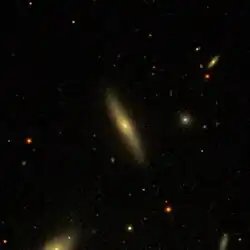| NGC 3844 | |
|---|---|
 SDSS image of NGC 3844 | |
| Observation data (J2000 epoch) | |
| Constellation | Leo |
| Right ascension | 11h 44m 00.8s[1] |
| Declination | 20° 01′ 46″[1] |
| Redshift | 0.022612[1] |
| Heliocentric radial velocity | 6779 km/s[1] |
| Distance | 320 Mly (97 Mpc)[1] |
| Group or cluster | Leo Cluster |
| Apparent magnitude (V) | 14.85[1] |
| Characteristics | |
| Type | S0/a[1] |
| Size | ~136,000 ly (41.6 kpc) (estimated)[1] |
| Apparent size (V) | 1.2 x 0.2[1] |
| Other designations | |
| CGCG 97-97, MCG 3-30-69, PGC 36481, UGC 6705[1] | |
NGC 3844 is a lenticular galaxy located about 320 million light-years away[2] in the constellation Leo.[3] The galaxy was discovered by astronomer Heinrich d'Arrest on May 8, 1864.[4] NGC 3844 is a member of the Leo Cluster[5][6][4] and is likely to be a low-luminosity AGN (LLAGN).[7]
See also
References
- 1 2 3 4 5 6 7 8 9 10 "NASA/IPAC Extragalactic Database". Results for NGC 3844. Retrieved 2018-07-15.
- ↑ "Your NED Search Results". ned.ipac.caltech.edu. Retrieved 2018-07-15.
- ↑ "Revised NGC Data for NGC 3844". spider.seds.org. Retrieved 2018-07-15.
- 1 2 "New General Catalog Objects: NGC 3800 - 3849". cseligman.com. Retrieved 2018-07-09.
- ↑ "Detailed Object Classifications". ned.ipac.caltech.edu. Retrieved 2018-07-15.
- ↑ "NGC 3844". Retrieved 2018-07-15.
- ↑ Sun, M.; Vikhlinin, A.; Forman, W.; Jones, C.; Murray, S. S. (2005). "The Survival and Destruction of X-Ray Coronae of Early-Type Galaxies in Rich Cluster Environments: A Case Study of A1367". The Astrophysical Journal. 619 (1): 169–177. arXiv:astro-ph/0408425. Bibcode:2005ApJ...619..169S. doi:10.1086/425298. ISSN 0004-637X. S2CID 16811452.
External links
 Media related to NGC 3844 at Wikimedia Commons
Media related to NGC 3844 at Wikimedia Commons- NGC 3844 on WikiSky: DSS2, SDSS, GALEX, IRAS, Hydrogen α, X-Ray, Astrophoto, Sky Map, Articles and images
This article is issued from Wikipedia. The text is licensed under Creative Commons - Attribution - Sharealike. Additional terms may apply for the media files.